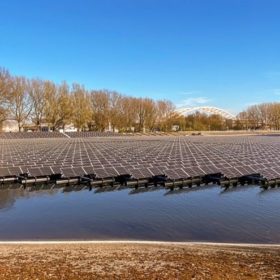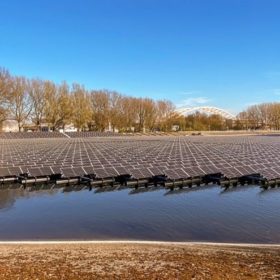Another floating solar park goes online in the Netherlands

Dutch water supplier Evides Waterbedrijf has commissioned a 1.6 MW floating PV plant at one of its facilities near Rotterdam. It is now considering the construction of more floating solar plants on three other reservoirs, including a 350-hectare water surface.
Dutch water supplier Evides Waterbedrijf has completed the construction of a 1.62 MW floating solar power plant at a reservoir in Kralingen, near Rotterdam.
The plant is expected to cover around 15% of the electricity demand of the company’s adjacent facility, with estimated annual power generation of 1.7 million kWh.
Evides Waterbedrijf said that it will start evaluating the impact of the 4,787 PV modules used in the plant at some point next year. The analysis will focus on algae growth, the spread of bacteria from bird droppings, reduced UV radiation on the water, and the impact of the wind.
“It is essential that the water quality in the reservoir remains good,” the company said.
It added that it may build more floating solar plants on its other three reservoirs, including the 350-hectare Biesbosch reservoir. The company estimates that 100% of its power demand could be met by solar panels deployed on 30% of the water surfaces it manages.
Evides Waterbedrijf was part of the Zon op Water consortium, an initiative under Rijkswaterstaat, the Dutch water-management agency. The Dutch Foundation for Applied Water Research (STOWA) is also part of the group, which is overseen by the Dutch Ministry of Infrastructure and the Environment and the Solar Energy Application Community (SEAC).
The Netherlands offers enormous potential for floating PV, as it has approximately 52,000 hectares of shallow inland water surfaces to use.
Rijkswaterstaat, which is part of the Dutch Ministry of Infrastructure and the Environment, xid in March 2017 that it planned to make water surfaces and land under its control available for the installation of renewable energy plants.


